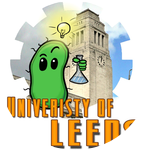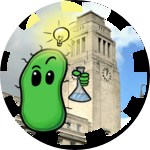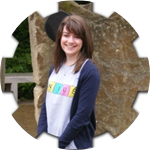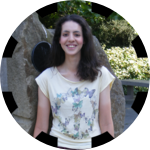About This Project
Testing the efficacy of water treatment facilities is a vital step in ensuring the safe production of drinking water. However in remote or low income areas cost and availability can severely limit the frequency of testing, possibly resulting in consumption of contaminated water. Our research aims to provide a low cost alternative that can easily be kept on site by engineering a bacterium to bind to contaand produce a easily detectable signal without the need for electricity or fossil fuels.
Ask the Scientists
Join The DiscussionWhat is the context of this research?
To develop a synthetic organism capable of detecting potentially lethal pathogens within a water supply at a low enough cost so that it is viable for use in extremely low income parts of the world.
Our organism, titled the Microbeagle, is a genetically engineering bacteria that detects particles via physical binding and activation of membrane stress pathways to generate reporter production and a visible signal.
Essentially our aim is to create a bacteria that can bind to a host of surfaces producing a visible signal that can easily be read without need for scientific training or expertise.
An important feature of our system is its modularity, the protein responsible for binding can easily be exchanged for another binding peptide of the users choice. This gives the microbeagle a potentially unlimited amount of uses in industry, healthcare and as research tool, a potential low cost solution to current methods of detection.
What is the significance of this project?
This research is aimed at producing a low cost detection system capable of being modified for a massive range of uses. Our suggested application would be as a low cost pathogen detection system that works free of electricity and fossil fuels. This research will allow low income or remote areas to test the efficacy of water treatment facilities with both an increased regularity and a reduced cost.
The research will also be put forward as a submission to the 2013 iGEM Competition. iGEM stands for International Genetically Modified Machines and is a large international competition in the field of synthetic biology which aims to produce a wealth of biological parts stored in an open source database on their website.
What are the goals of the project?
We're partially funded by our parent university; but need to purchase more PCR kits, as well as transport to SynBio conferences and the final iGem symposium in Lyon, France.
Budget
Lab equipment, Jamboree costs.
Meet the Team
Affiliates
We're a team of 7 undergraduate students from the University of Leeds with backgrounds in Biochemisty, Physics, Nanotechnology and other Life sciences
Team Bio
We are University of Leeds’s first iGEM team, composed of 8 undergraduates: five biochemists (Joe, Jonah, Oleg, Jeni, and Emily), a physicist (Paul), an engineer/nano-technologist (Dan) and a neuroscientist (Sabrina). We are further supported by faculty, post-docs and graduate students from the schools of Chemistry, Physics, and Molecular and Cellular Biology. Our research project aim is to develop a diagnostic strain of E.coli that can be flexibly repurposed to report the presence of a diversity of particles in solution, including living cells. A major application we envisage is on-site testing for waterborne pathogens. We are enthusiastic to conduct outreach efforts in both Yorkshire and cyberspace, with plans for presenting at local schools and for creating online tutorial videos.Leeds iGEM Team
We are University of Leeds’s first iGEM team, composed of 8 undergraduates: five biochemists (Joe, Jonah, Oleg, Jeni, and Emily), a physicist (Paul), an engineer/nano-technologist (Dan) and a neuroscientist (Sabrina). We are further supported by faculty, post-docs and graduate students from the schools of Chemistry, Physics, and Molecular and Cellular Biology. Our research project aim is to develop a diagnostic strain of E.coli that can be flexibly repurposed to report the presence of a diversity of particles in solution, including living cells. A major application we envisage is on-site testing for waterborne pathogens. We are enthusiastic to conduct outreach efforts in both Yorkshire and cyberspace, with plans for presenting at local schools and for creating online tutorial videos.
Jonah Ciccone
We're the first iGem team from the University of Leeds. Unlike many iGem teams we are small and student-led, although faculty members tend to drop in and offer advice.
The iGem project is an exciting chance for us to fund, design and develop our own piece of synthetic biology. We're also working on scientific outreach programs, we've been working with high school children to explain the wonders of SynBio; alongside taking a few older students into our lab for demonstrations.
We've also been making educational videos to spread the word of SynBio, check them out on our youtube page: https://www.youtube.com/user/igemleeds/videos
Please check out our wiki for more information; http://2013.igem.org/Team:Leeds
Paul Turner
Paul is a 4th year physicist at Leeds and the part of his degree he enjoys most is the aspects of problem solving. Outside of university he enjoys 10 pin bowling and has an interest in history. He is good at breaking down complex problems and explaining ideas and concepts to others. Skills Paul brings to the iGEM team are physical experiment design and coding experience for the website and computer side of the project. As a physicist he also has an outside view of synthetic biology
Emily Taylor
Emily is a second year biochemistry student at the University of Leeds with a particular interest in proteins, nucleosomes, and the field of immunology. Keen on volunteering, Emily hopes to one day work with elephants and children in Thailand! Emily lends her impressive organization skills, work ethic, and forward thinking vision to the Leeds iGEM team (and they thank her for it!). By the end of the project, Emily hopes to have built upon her lab skills and gain research experience in the real world of scientific research.
Sabrina Knight
Sabrina studied neuroscience at Leeds because she is interested in how we think, why we think and how it affects our behaviour. Of particular interest is neuropathology, or diseases affecting the brain, which Sabrina is hoping to study further at Imperial when she takes on her Masters. She joined the team because it offered novel and interesting to research and get involved in. Although the Team's project does not focus on neurology currently, Sabrina still brings essential skills and 3 years worth of lab experience - not to mention a different viewpoint!
Lab Notes
Nothing posted yet.
Project Backers
- 2Backers
- 1%Funded
- $15Total Donations
- $7.50Average Donation






